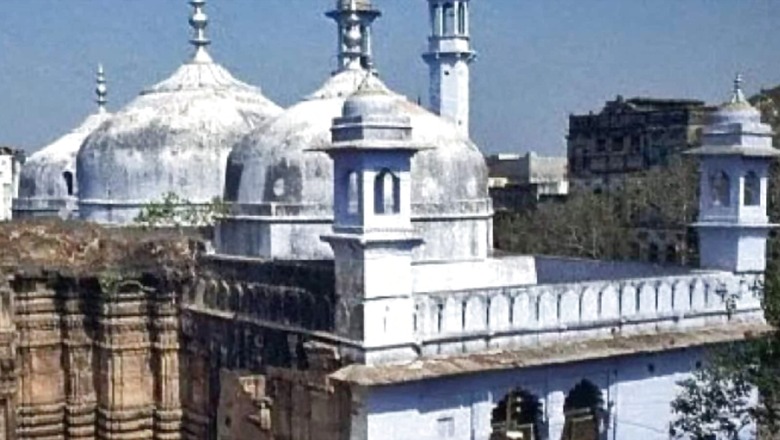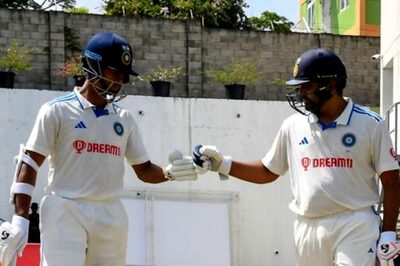
views
The court of Varanasi’s district judge AK Vishvesh on Thursday adjourned the hearing of the mosque committee’s plea till Monday (May 30). The petition by the Anjuman Intezamia Masjid Committee that manages the Gyanvapi Mosque challenged the maintainability of a plea by five Hindu women seeking access to the mosque complex, claiming there are idols of gods and goddesses inside the premises.
“The Muslim side’s arguments on the maintainability of the case remained incomplete today, which they will continue on May 30 — the date fixed by the court for the next hearing,” said District Government Counsel Rana Sanjeev Singh.
On May 24, the court gave one week’s time to both the Hindu and Muslim sides to file their objections to the report of a court-mandated videography survey of the mosque premises.
Earlier, a plea — seeking permission to worship the “Shivling” claimed to have been found on the premises during a videography survey ordered by a lower court — was also filed. The Supreme Court had on Friday transferred the Gyanvapi-Shringar Gauri complex case from a civil judge (senior division) to a district judge, saying looking at the ”complexities” and “sensitivity” of the issue, it is better if a senior judicial officer having an experience of over 25-30 years handles this case.
A fresh petition was also moved on Monday by Dr Kulpati Tiwari, Mahant of Kashi Vishwanath temple, for regular “puja” (worship) of the Shivling, which he said was found in the Gyanvapi mosque complex.
Meanwhile, Hindu Sena has also filed an application in the district court to be a party in the ongoing dispute. In addition to the ongoing plea, they also appealed for the total handover of the Gyanvapi site to Hindus for purpose of worshipping.
On May 16, the lower court had directed the district administration to seal a spot in the Gyanvapi Masjid complex after counsels representing the Hindu petitioners said a Shivling was found during a court-mandated videography survey. A mosque management committee spokesperson disputed the claim, telling a television channel that the object was part of a “fountain”. He said lawyers representing the mosque committee were not fully heard before the sealing order was announced.
The Hindu side claimed that the Shivling was found close to the “wazookhana” — a small reservoir used by Muslim devotees to perform ritual ablutions before offering the namaz.
Here’s a timeline of the case in various courts of law:
1937: The Allahabad High Court, in the Deen Mohammad vs. State Secretary case, ordered that while the Gyanvapi complex would be treated as Waqf property, the Hindu Vyas family would be in possession of the masjid’s basement and cellars.
1991: At the peak of the Ram Janmabhoomi movement, the Narasimha Rao government passed the Places of Worship (Special Provisions) Act in 1991. According to the law, with Babri Masjid in Ayodhya as the only exception, the religious character of all other places of worship would be maintained as it was on August 15, 1947.
October 1991: Petitioner Pandit Somnath Vyas (who claimed to be a descendant of Kashi Vishwanath temple priests) Dr Ramrang Sharma and others filed a suit in the Varanasi Court, demanding the mosque land for the construction of a new temple. They argued that the Places of Worship (Special Provisions) Act, 1991, didn’t apply to the mosque as it was allegedly built on the remnants of the old Visweshwar temple.
1998: The district judge ordered the case to be heard but on August 13, 1998, the Allahabad High Court stayed this decision.
March 2000: As Somnath Vyas passed away, the court named advocate Vijay Shankar Rastogi as the litigant in Oct. 2018. Rastogi then appealed to a civil judge to conduct a radar technical survey of the Gyanvapi complex. After the appeal was allowed, Gyanvapi authorities filed a petition in the HC against the order. The case is ongoing.
August 2021: In a fresh appeal, five women petitioners move a Varanasi court on August 18, 2021, demanding they be allowed to worship not just the Shringar Gauri shrine behind the Gyanvapi wall, but also all other “visible and invisible deities within the old temple complex”.
April 2022: On April 26, 2022, the court ordered the Gyanvapi site be inspected. The survey was finally conducted on May 14-16.
May 2022: The Hindu side claimed victory amid reports that the survey had revealed evidence of a shivalinga-like structure in the mosque’s wazukhana even as the Muslim side contended it was a defunct fountain. Though the Varanasi court asked that the area be cordoned off until the survey report was submitted, the Supreme Court had on May 17 also started to hear a special leave petition filed by the Gyanvapi management committee. While it didn’t order a stay on the survey’s proceedings, it did allow for namaaz to be freely offered inside.
May 2022: The Supreme Court on May 20 said it was moving the Gyanvapi case to a “senior and experienced judge” in view of the “complexities” and “sensitivity” of the issue. The court, which was hearing a petition challenging the filming of the mosque, added that “selective leaks” to the press must stop.
(With PTI inputs)
Read all the Latest India News here




















Comments
0 comment